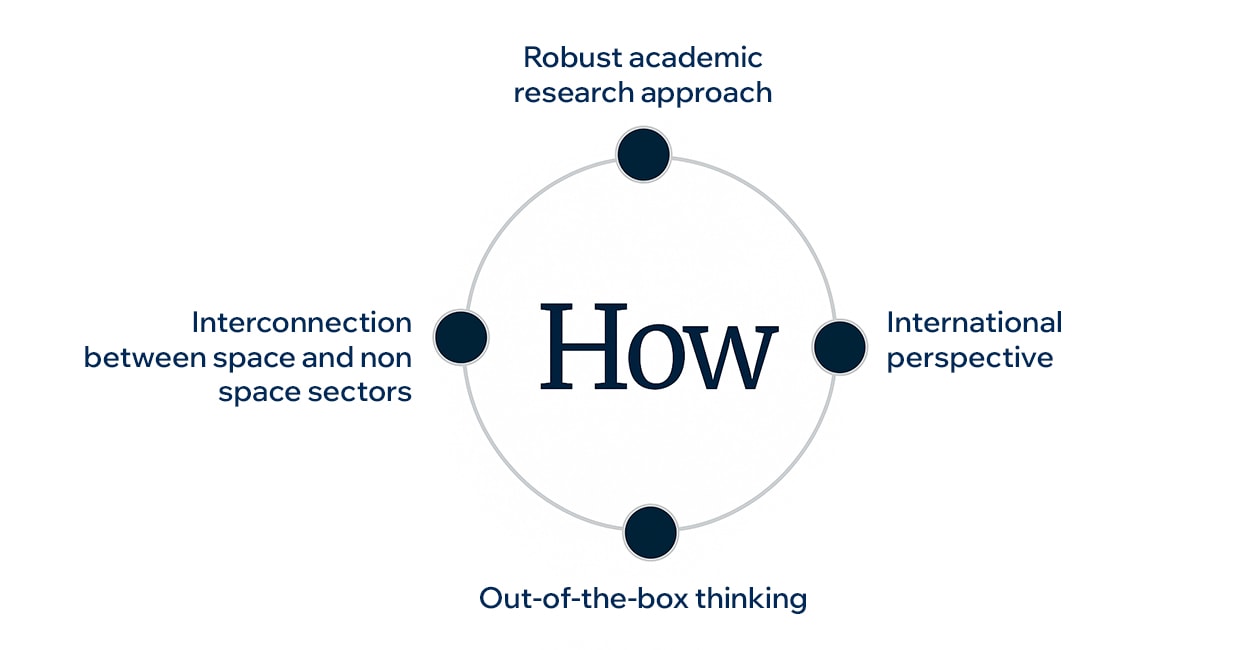Space Economy Evolution Lab
Starting from the study and analysis of spatial economics, SDA Bocconi's SEE Lab supports organizations by expanding their knowledge base and guiding them in selecting new economic business platforms.

"Science and technology define the limits of what is possible. The realization of the ‘possible’ depends on the economic and political benefits to human beings here on Earth".
Giovanni Bignami

Mission
The Space Economy Evolution Lab is a SDA Bocconi indipendent research center which offers a multidisciplinary perspective within the space sector: economic, technological, and policy factors are all integrated in its academic works.
The SEE Lab is committed to training future leaders with an out-of-the-box thinking, by generating and disseminating a comprehensive knowledge on the key aspects of the space economy in the short, medium and long term, at global level. For accomplishing its goals, the SEE Lab delivers strategic insights to private and public institutions to gauge the opportunities presented by space sector.
History and Reason Why
The SEE Lab was founded in 2018 at SDA Bocconi by Professor Andrea Sommariva, under the shared vision of Professor Nanni Bignami. At the time, the SEE Lab was the first research center, at global level, dedicated to the analysis of the economy of space, a sector that is facing an historical transition.
In the past, space sector was prerogative of few states, and run only by government agencies. Today, space sector is not a close world anymore! But it is open to different countries including a large number of actors all over the world -agencies, private manufacturing companies, public institutions, entrepreneurs, investment funds, universities- all operating in the sector, developing different products and services.
The consequence is a vibrant environment, with plurality of visions and interests, but also rising of conflicts and competition. Therefore, it is necessary to build a structured and coordinated ecosystem.
Target
The SEE Lab aims to provide space-oriented businesses, non-space industries, financial operators and public actors with an in-depth understanding and strategic insights to leverage the opportunities presented by the evolution of the space economy.
Activities
Specific Paths
The Lab’s activities on research and education focus on two main paths:

All the activities carried out in space to generate benefits for humanity on Earth.

All the initiatives performed in space to develop and enhance human presence and activities out of the Earth atmosphere.

The Laboratory aims at offering value to its Members in terms of:

Applied Research
It carries out independent, multidisciplinary and scientifically relevant and robust research projects.

Strategic Support
It provides its Members with the in-depth understanding and strategic insights necessary to gauge the opportunities presented by space economy.

Visibility & Networking
It offers to its Members a prestigious affiliation and a public positioning in the space domain. It is also a meeting point where space stakeholders can discuss market, political and technology aspects of space economy.

Knowledge Dissemination & Education
These activities are key drivers of the Lab’s research projects. It spreads research-based contents through events and customized courses.

Ideas Generation
It fosters the dialogue among its Members and stakeholders, leveraging on its broad network of scientific partners to spark ideas and strategic thinking.
Outputs
Publications, reports, case studies, and articles highlight the SEE Lab's ongoing contribution to the research and development of the space economy.
People-Space Team
The SEE Lab builds on a core team. It relies on SDA Bocconi and Bocconi University faculty’s support, and makes its Members and Partners actively engage into its activities.
- Simonetta Di PippoDirector

- Matteo NoriResearcher

- Nicola CarraroKnowldege Analyst

- Oscar Adrian Robalino FlorettKnowldege Analyst

TITAN BRAIN TRUST
It is high level dynamic forum, which supports the SEE Lab strategy through exclusive roundtables with SEE Lab members and external subjet-matter experts to discuss politics, market and technology.
GENERAL ASSEMBLY
It includes representatives of the SEE Lab Members according to the membership category. It provides the forum for the SEE Lab to present its yearly outcomes and its plans for the upcoming years. It will also allow to discuss key topics relevant to its activites. The General Assembly will normally take place once per year.
Media
News coverage, articles, and videos reflect the SEE Lab’s engagement with the broader space economy discussion.



